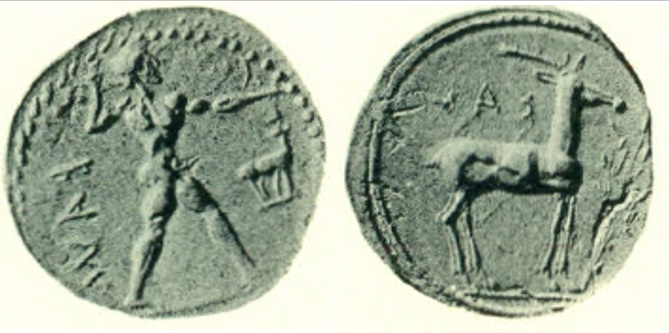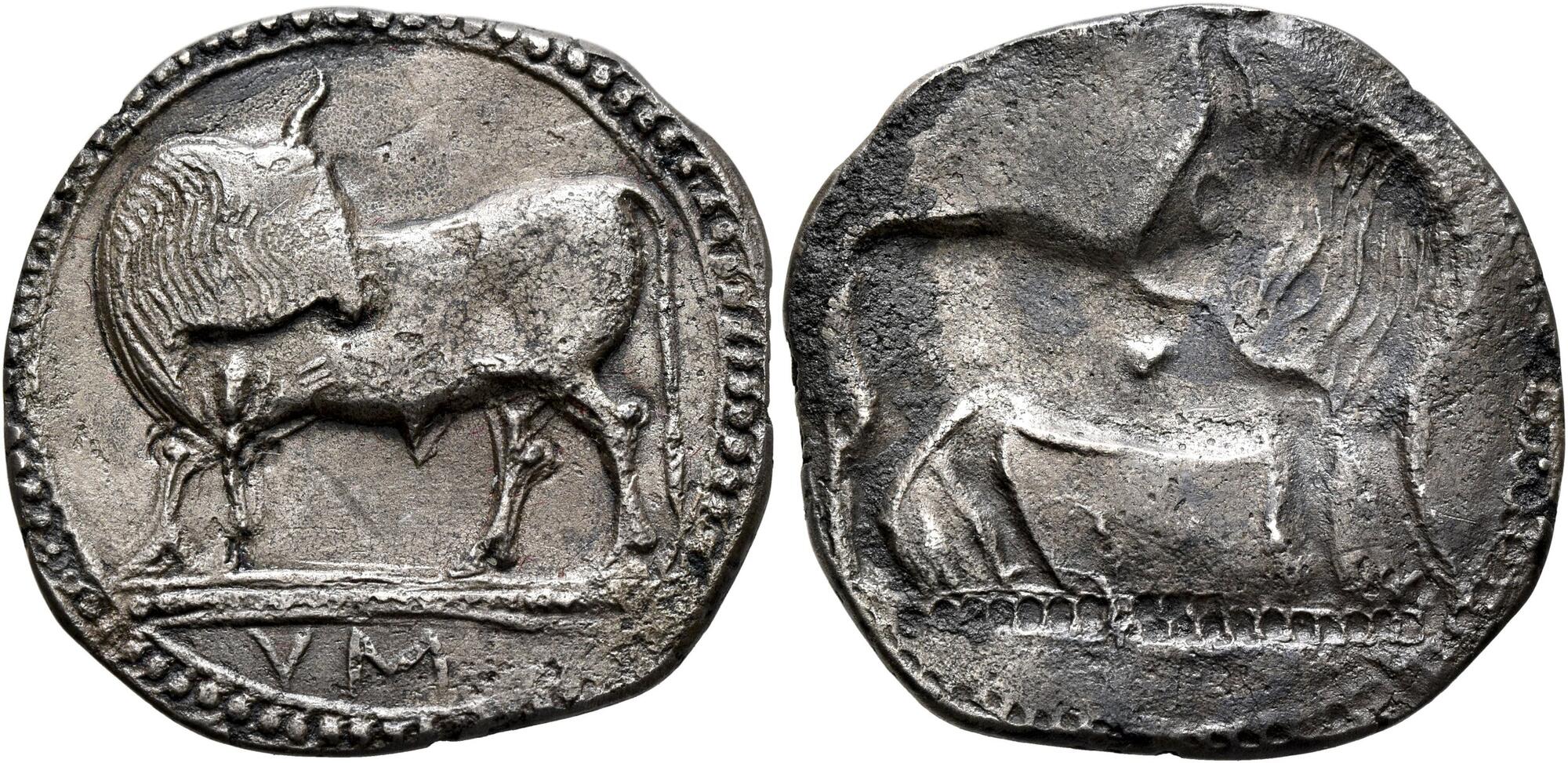475 BCE - 425 BCEΚΑVΛ | ΚΑV
Overstriking coin
Caulonia_New_York_over_Sybaris.jpg
Description
| ObverseInscription or printing placed on the obverse.:
|
ΚΑVΛ (Greek) Apollo advancing right, naked, brandishing laurel branch with right hand, a small daimon running on outstretched left arm. In right field, stag standing right. Border of dots.
|
ReverseInscription or printing placed on the reverse.:
|
ΚΑV (Greek) Stag standing right. Border of dots.
|
Mint and issuing power
| MintIdentifies the place of manufacture or issue of a numismatic object.:
|
Caulonia
|
Ancient regionAncient region.
|
Bruttium
|
Modern countryModern country: Italy
|
AuthorityIdentifies the issuing power. The authority can be "pretended" when the name or the portrait of X is on the coin but he/she was not the issuing power. It can also be "uncertain" when there is no mention of X on the coin but he/she was the issuing power according to the historical sources:
|
|
Chronology
| FromIdentifies the initial date in a range assigned in a numismatic context. 475 BCE toIdentifies the final date in a range assigned in a numismatic context.. 425 BCE
|
Classical 480-323 BC  periodTime period of the numismatic object. periodTime period of the numismatic object.
|
Physical description
MetalThe physical material (usually metal) from which an object is made.: Silver 
|
WeightWeight of the numismatic object (in grams). in grams: 8.058.05 g <br />8,050 mg <br />
|
DenominationTerm indicating the value of a numismatic object. Examples: tetradrachm, chalkous, denarius.: nomos
|
|
|
|
StandardStandard.: Achaian
|
References
| Coin referenceReference of the Coin:
|
Noe 1957, group VI, p. 30, pl. X, e
|
Coin series referenceReference to coin series study:
|
Noe 19571Noe 1957, group VI, p. 30, pl. X, e, SNG ANS 3 Bruttium-Sicily2SNG ANS 3 Bruttium-Sicily, n° 175-180, HN Italy3HN Italy, n° 2044, 2046, 2049, 2051-2152, HGC 14HGC 1, n° 1419
|
| Coin series web referenceCoin series web references:
|
|
Description
| ObverseInscription or printing placed on the obverse.:
|
Bull standing left on dotted ground line, his head turned back to right, in exergue, VM, all within border of dots
|
ReverseInscription or printing placed on the reverse.:
|
Bull standing right on dotted ground line, his head turned back to left, all within border of dots
|
Mint and issuing power
| MintIdentifies the place of manufacture or issue of a numismatic object. ᵖ:
|
Sybaris
|
Ancient regionAncient region. ᵖ
|
Lucania
|
Modern countryModern country: Italy
|
AuthorityIdentifies the authority in whose name (explicitly or implicitly) a numismatic object was issued. ᵖ:
|
|
Chronology
| FromIdentifies the initial date in a range assigned in a numismatic context. 550 BCE toIdentifies the final date in a range assigned in a numismatic context.. 510 BCE
|
Archaic until 480 BC  periodTime period of the numismatic object. periodTime period of the numismatic object.
|
Physical description
| DenominationTerm indicating the value of a numismatic object. Examples: tetradrachm, chalkous, denarius. ᵖ:
|
nomos
|
|
|
References
References
- ^ Noe, Sydney P. (1957), "Overstrikes in Magna Graecia", American Numismatic Society. Museum Notes 7, p. 13-42, pl. 5-14.
- ^ Troxell, Hyla A. (1975), Sylloge Nummorum Graecorum ANS 3. The Collection of the American Numismatic Society. Sicily 3 (Bruttium-Sicily I: Abacaenum-Eryx), New-York, pl. 38.
- a b Rutter N. Keith et alii (eds.) (2001), Historia Numorum Italy, London, xvi, 223 p., 43 pl.
- ^ Hoover, Oliver D. (2018), The Handbook of Greek Coinage Series, Volume 1. Handbook of Coins of Italy and Magna Graecia, Sixth to First Centuries BC., Lancaster-London, 2018, lxi, 527 pages, 23 cm
- ^ Babelon, Jean (1924-1936), Catalogue de la collection de Luynes : monnaies grecques, 4 vol., Paris, Bibliothèque nationale.


